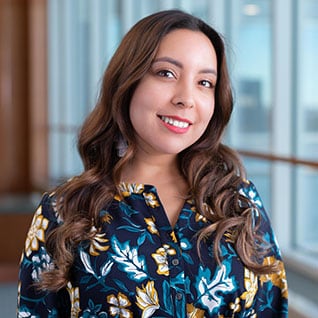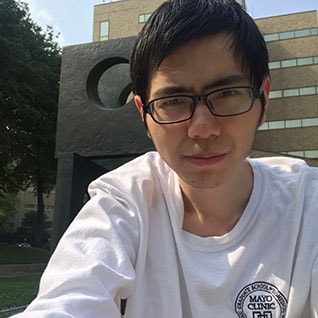/prod01/channel_2/media/mccms/content-assets/about/news/may-august-2023/1024X512_Research-Lab-Saad-J.-Kenderian-1594058_3855074_0002.jpg)
September 1, 2023
In this article series, students who are near the end of their Ph.D. training at Mayo Clinic Graduate School of Biomedical Sciences talk about their research journeys, lessons learned, and hopes for the future.
Claudia Manriquez Roman: CAR-T cell therapy for cancer
Hometown: Ciudad Juarez, Mexico
Graduate track: Virology and Gene Therapy/Regenerative Sciences
Research mentor: Saad Kenderian, M.B., Ch.B., Mayo Clinic in Rochester, Minnesota
What were the biomedical issues you addressed in your research, and what did your studies find?
My research focused on the development and optimization of a cellular treatment for cancer and autoimmune diseases, specifically the immunotherapy known as chimeric antigen receptor-T cell therapy, or CAR-T cell therapy. The underlying principle of CAR-T cell therapy involves modifying a patient’s own immune system so that the T cells express proteins that bind only to cancer cells. The engineered T cells then kill off the cancer cells. As a treatment that can be individualized for patients, CAR-T cell therapy currently is being used primarily for blood cancers like leukemias and lymphomas.
The focus of my research was understanding the activation of CAR-T cells when they encounter tumor cells. I also wanted to understand why CAR-T cells that are overactivated in some cases undergo the process of cell death, known as apoptosis. I addressed the question: "How can we modulate the CAR-T cell apoptotic machinery to reduce CAR-T cell death while enhancing the cells' tumor-killing capabilities?"
My studies found that reducing the presence of a specific cytokine, an inflammatory molecule that’s present in patients who experience CAR-T cell-associated toxicities, resulted in CAR-T cells that are less prone to apoptosis. I found similar results depleting a specific receptor involved in the apoptotic pathway. I also found tumor cells pre-treated with a monoclonal antibody, followed by CAR-T cell treatment, led to the reduction of CAR-T cell apoptosis while enhancing the anti-tumor activity. My thesis project opened the door to new approaches that can be explored to improve the therapeutic efficacy of CAR-T cells, not only in blood cancers but in solid tumors as well.
How did the research environment at Mayo Clinic contribute to the success of your projects?
The environment at Mayo really promotes asking questions. In my research, I used a variety of approaches, including lentiviral technology, flow cytometry experiments, and gene editing tools like CRISPR/Cas9. One aspect I believe is so unique to Mayo Clinic is the ability to establish so many collaborations and how common interests between scientists can shape an amazing research investigation. I had wonderful mentors who were looking out for me and my career and who always reminded me to never stop fighting for my dreams.
Most of all, being in a translational lab has given me the opportunity to meet patients at Mayo Clinic who have received CAR-T cell therapy. Seeing that what I’m doing in the lab connects to helping patients has been one of the most rewarding feelings in my career so far.
What’s next?
As an international student, I consider myself extremely lucky to have had the opportunity to pursue my Ph.D. training at Mayo Clinic. I’m deeply excited that my next role will be as a scientist and engineer in the Center for Regenerative Biotherapeutics at Mayo Clinic, with the goal of fully translating our CAR-T cell products into therapies that can be tested in clinical trials to become cures for patients.
Tianchu Wang: Halting kidney cancer
Hometown: Hefei, China
Graduate track: Molecular Pharmacology and Experimental Therapeutics
Research mentor: Keith Robertson, Ph.D., Mayo Clinic in Rochester
What biomedical issues did you address in your research, and what did your studies find?
My research focused on exploring mechanisms driving the metastasis of kidney cancer. Once kidney tumor cells begin to metastasize, stopping or reversing the spread of the disease becomes difficult, often resulting in poor outcomes for patients. Few treatments exist to address metastases. Those that are available, mostly targeting individual genes, have limitations — for instance, low response rates or eventual chemotherapy resistance after prolonged treatment.
Understanding kidney cancer at an epigenetic level may provide additional opportunities to interfere with the metastatic process. Epigenetics is a growing area of research that looks at modifications in gene expression rather than changes in genes themselves. My thesis project studied how mutations in an epigenetic regulator drive a process known as epithelial-to-mesenchymal transition, or EMT, that changes cells on the outer layer of organs into undifferentiated cells. Even though EMT occurs naturally in the body, it’s also known to be part of tumor progression, making cancerous cells more migratory and invasive, and allowing them to metastasize to other tissues and organs.
My studies looked at CRISPR-cas9-engineered kidney cancer cell lines and involved the analysis of omics — the large-scale information available in gene expression. My studies found several key proteins — specifically, transcription factors that turn genes on and off at controlled rates — involved in EMT that could be promising therapeutic targets for metastatic kidney disease. Our team has publications currently in progress, and Dr. Robertson’s lab will continue to investigate the transcription factors that we identified.
How did the research environment at Mayo Clinic contribute to the success of your projects?
One unique aspect of Mayo’s research environment is the culture of collaboration, which happens across labs and even across campuses. Dr. Robertson’s lab collaborates with hematologist-oncologist Thai Ho, M.D., Ph.D., a clinician-scientist at Mayo Clinic in Arizona who also conducts research in the epigenetic control of cancer development. He provided cell lines and tissue samples that were essential to my research.
Another unique aspect, and the reason I chose Mayo for graduate school, is the attention that’s given to patient care and the focus on disease-related research. Mayo’s research environment helped me further understand how basic science results can be the foundation of translational research that leads to cures for patients.
How has your experience at Mayo Clinic Graduate School of Biomedical Sciences prepared you for your future career?
In addition to the benchwork science involved in my research, I had the opportunity to learn how to analyze and understand big data, such as RNA-seq and ChIP-seq. These skills will be essential for the biomedical workforce of the future. My next role will be as a postdoctoral fellow at Dana-Farber Cancer Institute to continue the exciting research about how the epigenome controls cancer metastasis.